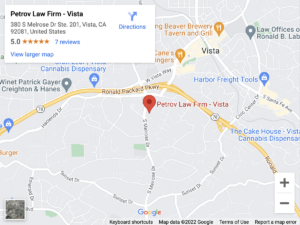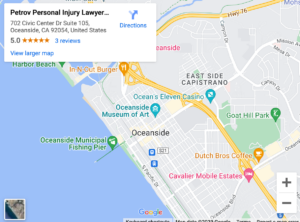
“PIP” means personal injury protection. PIP insurance is a form of auto insurance that is available (and generally mandatory) in states that apply a no-fault system to auto insurance.
California, however, is not a no-fault state.
Because of this, PIP insurance is not available in California. The closest functional equivalent is MedPay, which differs from PIP coverage in some important ways.
California Is an At-Fault Auto Insurance State

If you suffer a car accident in California, it matters whose fault the accident was. If you believe the accident was someone else’s fault, you have two options:
- Sue the at-fault driver; or
- File a third-party claim against the at-fault driver’s liability insurance policy.
You can also file a third-party claim, attempt to negotiate, and then sue as soon as negotiations stall. If the other driver believes you were at fault, however, they can file a claim against your liability insurance policy or sue you directly.
California’s Mandatory Car Insurance Requirements
California requires drivers of cars registered in-state to purchase the following minimum insurance as a condition for driving on California public roads:
- $15,000 for injury or death to one person;
- $30,000 cumulative compensation per accident for injury/death; and
- $5,000 for damage to property.
More than 15% of California drivers are uninsured, despite the fact that insurance is mandatory.
California MedPay
California MedPay is voluntary insurance. Unlike liability insurance, you don’t have to carry MedPay if you don’t want to. It would be a good idea, however, for many reasons.
MedPay is No-Fault
Like PIP insurance, MedPay is no-fault. That means you can use it regardless of who was at fault for the accident.
You can use it for a hit-and-run accident, for example, or for an accident with an uninsured or underinsured driver. Naturally, you can also use it if you were at fault for the accident that injured you.
MedPay Scope of Coverage (Losses)
MedPay will cover just about any reasonable and necessary medical expenses, including (but not necessarily limited to):
- Acupuncture services
- Ambulance and hospital fees
- Chiropractic treatment
- Crutches or walkers
- Dental care resulting from the accident
- Diagnostic tests
- Doctor visits
- Hearing aids, if damaged in the accident
- Home health care services
- In-home nursing care
- Mental health counseling, if related to the accident
- Nursing services
- Occupational therapy
- Orthopedic devices
- Pain management programs
- Physical therapy
- Prescription medications
- Prosthetic devices
- Rehabilitation therapy
- Speech therapy
- Surgery and X-rays
- Transportation costs to and from medical appointments
- Wheelchair rental
- Medical supplies like bandages
- Other necessary medical expenses related to the accident
MedPay will also generally cover funeral expenses if necessary.
MedPay Coverage Limits
As long as you’re willing to pay the premiums, you can purchase MedPay with a variety of policy limits: $1,000, $2,000, $,$5,000, $10,000, $25,000, and even $100,000 in some instances.
Under no circumstances will an insurance company pay you a dime more than its policy limits unless you win a bad faith insurance lawsuit against them. On the bright side, MedPay has no deductible that you have to pay before benefits kick in.
What MedPay Won’t Cover
MedPay won’t cover most of the items that you might request compensation for in a personal injury lawsuit, including:
- Lost wages
- Pain and suffering
- Emotional distress
- Out-of-pocket expenses such as child care;
- Punitive damages
- Property damage or diminution in the value of your car
- Car rental
- Your own liability for another person’s damages
- Legal fees
Basically, the name says it all: MedPay pays for medical care and very little else.
MedPay Scope of Coverage (People)
If you purchased MedPay, it covers you in the event of an auto accident. So, who else does it cover? A few examples are:
- Your passengers at the time of the accident. Their medical expenses can be covered regardless of who caused the accident.
- You, when you are a passenger in someone else’s car, even if they don’t carry MedPay
- The driver of a car in which you were a passenger (during an accident), even if the driver doesn’t carry MedPay;
- You, when you are a pedestrian or cyclist.
- Your family members who live in your household (check your policy language just to make sure).
Read your policy carefully no matter what, as it may contain tricky loopholes. Better yet, have your lawyer look it over.
Take the Next Step: Secure Your Rights With the Assistance of a Vista Personal Injury Lawyer
If you have been involved in an injury car accident in North County San Diego that you even suspect was someone else’s fault, you might need legal assistance. Don’t wait around while the glue of circumstance hardens around your feet.
Schedule a free initial consultation with Petrov Personal Injury Lawyers as soon as possible at (619) 344-0360.


